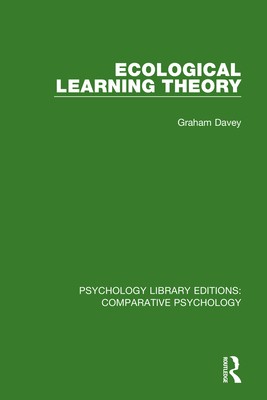
- We will send in 10–14 business days.
- Author: Graham Davey
- Publisher: Routledge
- ISBN-10: 1138555061
- ISBN-13: 9781138555068
- Format: 15.6 x 23.4 x 2.1 cm, softcover
- Language: English
- SAVE -10% with code: EXTRA
Reviews
Description
Originally published in 1989, this title presents a view of adaptive behaviour which integrates both evolutionary and psychological perspectives on learning. The study of learning, and in particular conditioning, had evolved in isolation from the rest of the biological sciences, and until the late 1980s had largely ignored the fact that learning processes are adaptive functions subject to the pressures of evolutionary selection. This text is designed to give a thorough insight into contemporary views of learning mechanisms, at the same time incorporating an evolutionary perspective on the function and performance of learning.
Graham Davey gives a detailed introduction to evolutionary approaches to behaviour and basic learning phenomena such as Pavlovian and instrumental conditioning. He also provides a comparative introduction to both learning and performance aspects of conditioning. He covers ecological approaches to adaptive behaviour (e.g. foraging theory), specialized learning processes such as concept formation, spatial learning, and language learning.
Innovative in its integration of ecological and evolutionary approaches with more traditional associative views of learning, the book introduces the reader to learning in a very wide variety of species other than the traditional laboratory rat and pigeon. It will be valuable to anyone with a general interest in animal behaviour, and also to those with a specific interest in learning, adaptive behaviour, and evolutionary approaches to behaviour.
EXTRA 10 % discount with code: EXTRA
The promotion ends in 19d.23:08:19
The discount code is valid when purchasing from 10 €. Discounts do not stack.
- Author: Graham Davey
- Publisher: Routledge
- ISBN-10: 1138555061
- ISBN-13: 9781138555068
- Format: 15.6 x 23.4 x 2.1 cm, softcover
- Language: English English
Originally published in 1989, this title presents a view of adaptive behaviour which integrates both evolutionary and psychological perspectives on learning. The study of learning, and in particular conditioning, had evolved in isolation from the rest of the biological sciences, and until the late 1980s had largely ignored the fact that learning processes are adaptive functions subject to the pressures of evolutionary selection. This text is designed to give a thorough insight into contemporary views of learning mechanisms, at the same time incorporating an evolutionary perspective on the function and performance of learning.
Graham Davey gives a detailed introduction to evolutionary approaches to behaviour and basic learning phenomena such as Pavlovian and instrumental conditioning. He also provides a comparative introduction to both learning and performance aspects of conditioning. He covers ecological approaches to adaptive behaviour (e.g. foraging theory), specialized learning processes such as concept formation, spatial learning, and language learning.
Innovative in its integration of ecological and evolutionary approaches with more traditional associative views of learning, the book introduces the reader to learning in a very wide variety of species other than the traditional laboratory rat and pigeon. It will be valuable to anyone with a general interest in animal behaviour, and also to those with a specific interest in learning, adaptive behaviour, and evolutionary approaches to behaviour.


Reviews